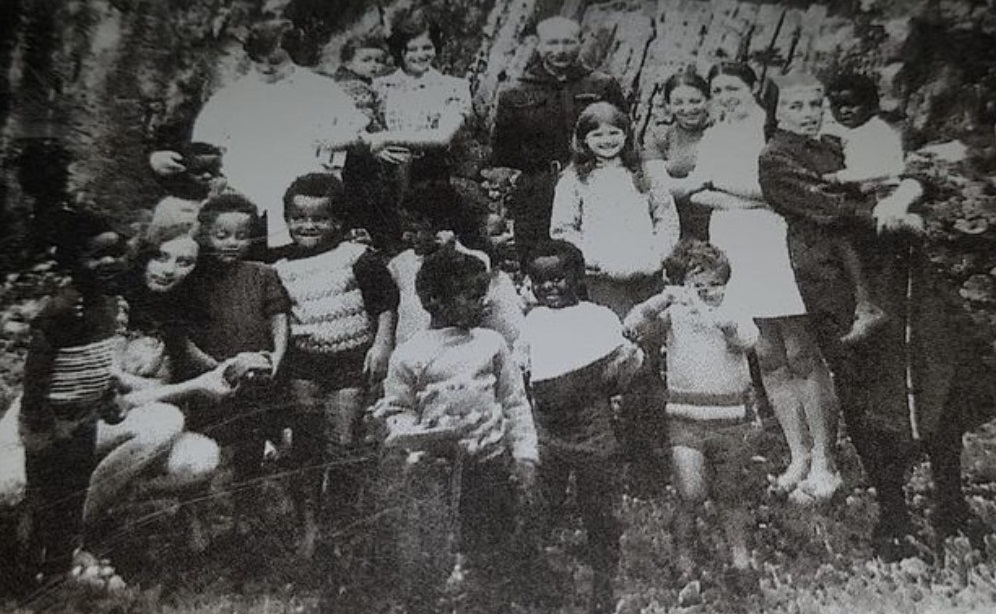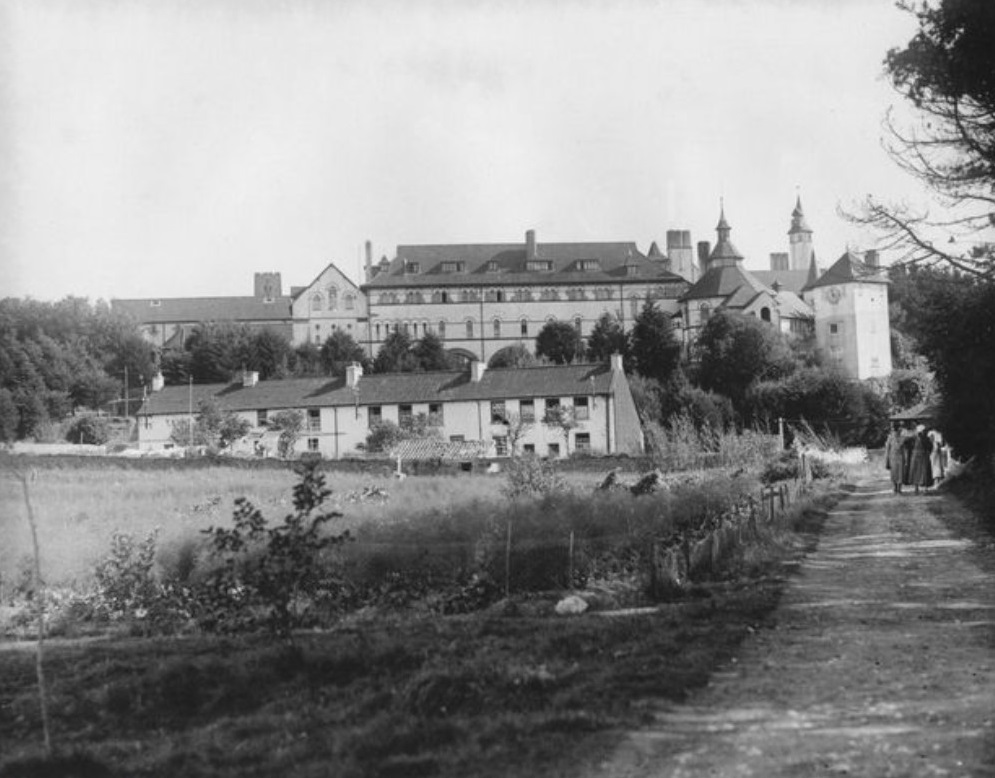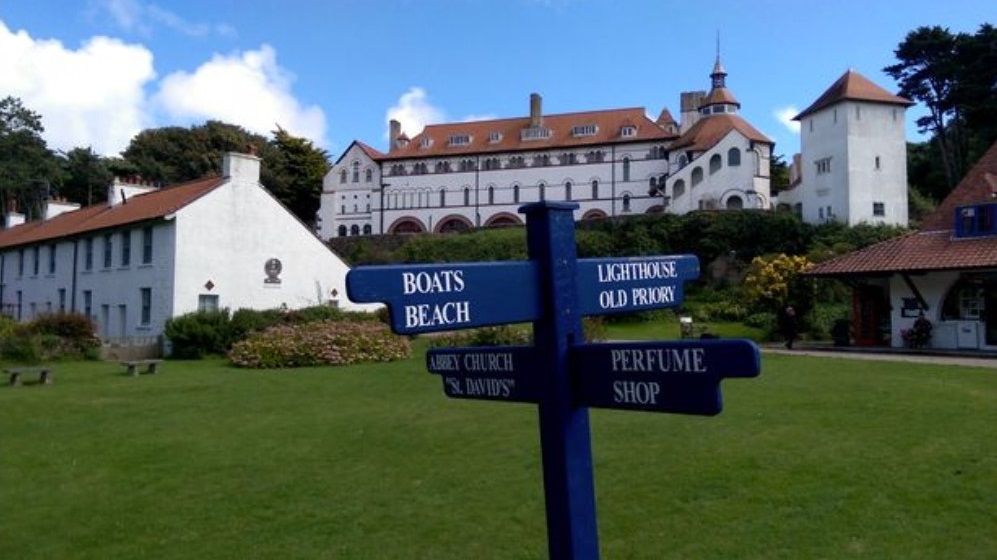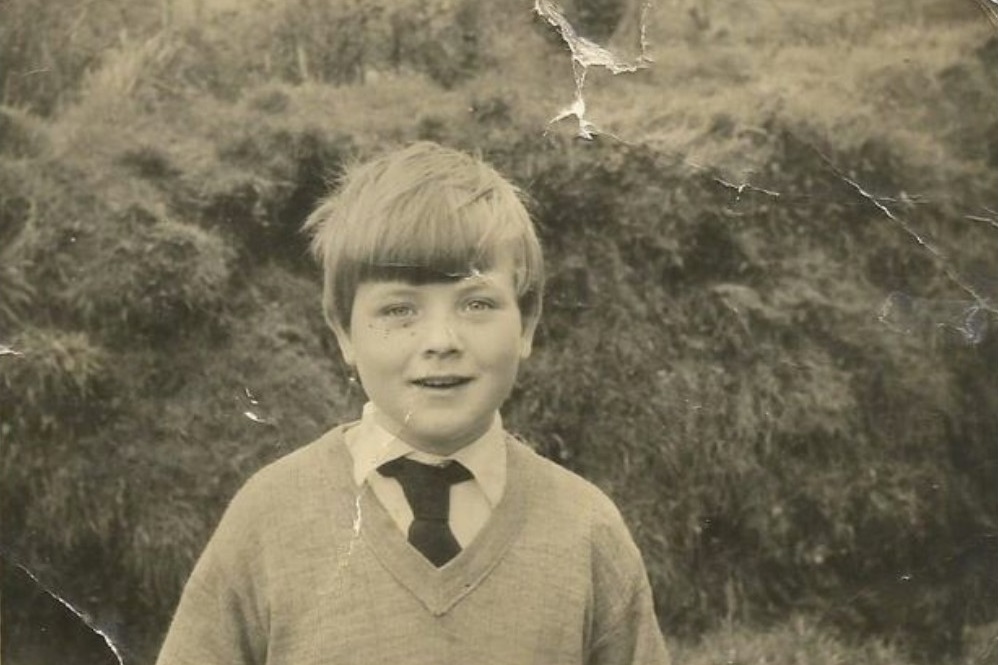SWANSEA (UNITED KINGDOM)
WalesOnline [Cardiff, Wales, UK]
December 26, 2021
By Laura Clements
[Photo above: Kevin O’Connell, as a young boy on Caldey Island (Image: Kevin O’Connell / Caldey Island Survivors Campaign)]
A victim of alleged historical sexual abuse on Caldey Island has described the hideous abuse he says he suffered in the popular tourist destination.
Kevin O’Connell, 59, is campaigning for a public inquiry into the alleged abuse. He claims he was sexually abused by Father Thaddeus Kotik, a monk living on Caldey Island, as an 11-year-old child. He said Kotik even followed him back to his family home and the abuse continued in his own childhood bedroom.
Six women who alleged abuse by Kotik between 1972 and 1988 have previously been given an out-of-court settlement by the Cistercian Order and subsequently a total of 20 people came forward to allege abuse.
At the time, the Caldey Island abbot Daniel von Santvoort apologised saying he was “truly sorry” allegations made at the time had never been passed on to the police and expressed regret for harm caused.
“What I saw with my eyes is a horrible time on Caldey Island,” said Mr O’Connell. “It was such a horrible place.”
Time has not dulled the memory of Mr O’Connell, who first visited Caldey off the Pembrokeshire coast when he was aged six. The abuse by Kotik began in the sand dunes, which the priest called their “special place”.
Talking to WalesOnline, he said: “The police don’t understand little things like how they took my t-shirt away from me. Having clothes to go away on holiday was special. Going home without that causes problems. And that’s how I remember it and they’d say why did they take your clothes?”
In those years it was commonplace for children to be sent to Caldey Island to stay with the monks during the summer holidays. Mr O’Connell’s family had been referred to the Catholic Church by social services as the church would take youngsters from struggling families who they thought deserved a break.
“That was quite a shock to me that I was under a court protection order,” said Mr O’Connell, who only learned of his family situation as an adult. “[My sister] came over with me once to the island. And they raped her. I’ll never forget there was nothing in the world that I could do. Nobody cared.”

His sister led a troubled life after that, Mr O’Connell said, where she turned to drugs and struggled with long-term relationships. She died a few years ago.
“I had nobody to protect me and nobody to protect my sister,” he continued. “I am my sister’s voice and the other victims’ until we get there. We never spoke about it and that was always one of my regrets. I only saw her once a year and it was never long enough to sit down properly.”
Mr O’Connell said he can vividly remember being abused by another Catholic priest named Father Charles Jeffries, who he first met on Caldey Island. Mr O’Connell claimed Kotik and Fr Jeffries both visited his parents’ home in Newcastle Emlyn.

“They followed us back to my home,” Mr O’Connell said, adding that Father Charles raped him in his own childhood bedroom. “And I always remember in my bedroom, there was a bolt on the door,” Mr O’Connell explained. “So I couldn’t get out. And this was happening in my own home.”
As well as his own bedroom, Mr O’Connell said he was also sent on holiday to Fr Jeffries’ home in Sussex annually for about five years in the late 1960s and early 1970s, where he said the abuse continued at the hands of what he believed to be priests and religious figures.
Speaking to Newyddion S4C, Mr O’Connell said: “It would start off, you’d be given a pill before, it’s a double bed, you came out of the bedroom. In the evening, I’d be taken to this room. There’d be men. They’d be drinking, smoking. Then they’d give me this mead, I know now it was mead.
“And then… things would start happening when they would take my pants off.” He said he coped by taking his mind elsewhere, into a “fantasy world”.
“I used to have an escape route in my mind where I would blank off what was happening around me. Sometimes for hours, sometimes for days where I’d go into a fantasy world – dragons or whatever,” he said.
“A fantasy world. I think that saved me. Because when I do wake up, I always woke up in the double bed. No pants or whatever.”
Caldey Island off the coast of Tenby in Pembrokeshire is renowned as an idyllic tourist attraction, popular among day-trippers. It is home to a group of Cistercian monks, an order of the Catholic Church who avoid unnecessary speech and focus on prayer and hard labour.

When claims of child abuse on Caldey Island first came about, they were not properly reported, said Mr O’Connell. He said he first told a priest at his local Catholic Church while the abuse was still happening. But the young boy was told if he said such things God would turn his back on him, the devil would be under the bed or the mirror, and a severed hand would come through the letterbox and strangle him.
Kotik, a Cistercian Monk who had lived on Caldey Island since 1947, died in 1992 without facing any criminal charges into claims he had abused children. In 2017, six women received compensation from the island’s Cistercian abbey after claiming to have been abused by Kotik.
There are at least 21 victims who have since come forward and reported similar offences to Dyfed Powys Police with cases going back to the 1960s.
Mr O’Connell is campaigning for a public inquiry into alleged historical child sexual exploitation on the Pembrokeshire island. Earlier this year, he presented a petition containing over 5,000 signatures to the Senedd’s Petitions Committee which was subsequently closed.
The Welsh and UK governments have also rejected calls for an inquiry. But Mr O’Connell said an inquiry is desperately needed to learn lessons of the past and prevent failings in future. He believes the shadowy way the Cistercian Order operates on Caldey Island left the door open for abuse to go unchallenged for years.
In 2019 Mr O’Connell contacted S4C’s current affairs programme, Y Byd ar Bedwar, in a bid to get answers from the Church authorities who’d turned a blind eye to Kotik’s crimes. The programme reported how the abbey was told by a victim about Kotik’s abuse in the 1980’s but did not report it to police until 2014. Instead the abbot in charge at the time, Robert O’Brian, asked the victim for forgiveness.
“My fight is to get a public inquiry,” said Mr O’Connell. “They [the monks] only listen to their own law- that’s ridiculous in today’s age. The world needs to know that there are victims are all over the world and that’s my fight. I suffered all my life terribly. We’ve had no children because of the abuse that happened and I was just one of thousands. The authorities don’t understand that what I saw was horrible.”
“It’s one step at a time to get the message out there… until we get what we need, until people start saying we’ve got to do something about this. We’ll carry on, we’ll shout and scream. People can’t just live hiding their lies behind the walls of Jericho. We will shout until we bring them down and that’s my aim.”
Mr O’Connell hasn’t lost his faith, but said he is no longer a Catholic, saying: “I pray better at home than I do in a church.”
He added: “What I want is the truth coming out and people coming forward just so they can get the help they need.”
He believes there must be hundreds of victims with their own stories: “We’re up against a barrier of lies and deceit, but we’ll break through it,” he said.
In October 2018, Mr O’Connell provided an anonymised statement to Dyfed-Powys Police via his MP, Ben Lake, which gave an account of his abuse by Fr Jeffries. The last sentence of his statement read: “Because of Caldey Island and Father Thaddeus, my family became friends with Father Charles on Caldey who was from Sussex, because of this I was raped in my own bed and gang raped in his home parish for five years.”
But it wasn’t until May the following year that officers contacted Mr O’Connell and it was another five months until they interviewed Mr O’Connell, where he made his allegations against Fr Jeffries during a six-hour long interview. But, in the intervening time, Fr Jeffries had died in March 2019.
A file was then passed on to Sussex police, as the diocese where Fr Jeffries served was largely within that force area. However because Fr Jeffries had died, the case was closed.
“While we cannot prosecute persons who are deceased, all victims are asked to provide an account to police in order that any other persons linked to the offence can be investigated fully,” said Dyfed Powys Police.
Mr O’Connell said he has now lost faith in a police investigation.
He said: “I will not speak to Dyfed-Powys Police ever again,” he added.
“I want it to end,” he added. “I don’t want Caldey to be a never ending story for people. I want it to end and things to be done properly and put in place.”

